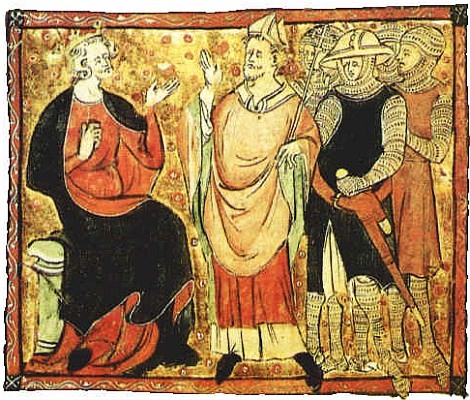"Will no one rid me of this turbulent priest?" Becket, Shakespeare, James Comey, and Fulton Armstrong
What I learned today about Shakespeare's influence on the phrase,
"Will no one rid me of this turbulent priest?" attributed to Henry II regarding Thomas Becket,
(I may be coming late to this insight compared to some!)
Timeline:
1170 - Archbishop Thomas Becket [1] is killed in Canterbury Cathedral.
1180 - Edward Grim [2] publishes a book on the Life of St. Thomas (Becket), based in part on his own witness, quotes King Henry II of England as saying to a gathering on Christmas, 1170,
"What miserable drones and traitors have I nurtured and promoted in my household who let their lord be treated with such shameful contempt by a low-born cleric!" [3]
This seems to have inspired eager followers of Henry II to assume that killing the archbishop would please the king.
1595–96 William Shakespeare writes his play, Richard II, published in 1597. In this play, Richard II relinquishes the crown to Henry Bollingbroke. In Act 5, scene 4, Sir Pierce of Exton says to a servant,
Didst thou not mark the king, what words he spake,
'Have I no friend will rid me of this living fear?'
Was it not so?
They take this as permission to serve the new king by killing the deposed Richard.
1740 - "The popular version of the phrase was first used in 1740 by the author and bookseller Robert Dodsley, in his Chronicle of the Kings of England, where he described Henry II's words as follows:
'O wretched Man that I am, who shall deliver me from this turbulent Priest?'
This was allegedly modelled at least in part on Romans 7:24: 'O wretched man that I am! who shall deliver me from the body of this death?'" [4]
But the 1740 version of the phrase by Dodsley also seems to have been influenced by Shakespeare's Richard II. 2005 - A.G. Harmon claims that these parts of Richard II in Shakespeare are based in part on the death of Thomas Becket. [5]
2017 - "James Comey described his situation with President Trump by using a quote from Henry II — one that purportedly led to the assassination of a priest in the 12th century.
Sen. Angus King, I-Maine, asked whether Comey interpreted certain phrases from the president of the United States, such as "I hope" or "I suggest," as directives.
"Yes. It kind of rings in my ears as, 'Will no one rid me of this meddlesome priest?'" Comey replied.
2022 - "Fulton Armstrong, a former senior US intelligence official" refers to the Dodsley version of the quote regarding efforts of John Bolton to get Armstrong fired.
See YouTube video below, starting at about 10 minutes.
Bolton was National Security Advisor to President Donald Trump from April 2018 to September 2019.
These are just two examples of modern uses of the quote.
NOTES:
[1] https://en.wikipedia.org/wiki/Thomas_Becket
[2] https://en.wikipedia.org/wiki/Edward_Grim
[3] https://en.wikipedia.org/wiki/Will_no_one_rid_me_of_this_turbulent_priest%3F
[4] https://en.wikipedia.org/wiki/Will_no_one_rid_me_of_this_turbulent_priest%3F#Origin
[5] Studies in English Literature, 1500-1900
Vol. 45, No. 2, Tudor and Stuart Drama (Spring, 2005), pp. 315-331 (17 pages)
https://www.jstor.org/stable/3844547
[6] https://www.usatoday.com/story/news/politics/onpolitics/2017/06/08/comey-what-trump-thinks-him-no-one-rid-me-meddlesome-priest/102628176/
[7] https://youtu.be/FIbiR6q5Zbk?t=593
IMAGE: 14th-century depiction of King Henry II of England with Archbishop of Canterbury Thomas Becket. Public domain. Via Wikipedia:
https://en.wikipedia.org/wiki/Will_no_one_rid_me_of_this_turbulent_priest%3F#/media/File:Jindrich2_Beckett.jpg
~~~~~~~~~~~~~~~~~~~~~~~~
Disclaimer: If and when I quote or paraphrase bible passages or mention religion in many of my blog posts, I do not intend to promote any religion over another, nor am I attempting to promote religious belief in general; only to explore how the Bible and religion influenced Shakespeare, his plays, and his age.
~~~~~~~~~~~~~~~~~~~~~~~~
~~~~~~~~~~~~~~~~~~~~~~~~~~~~~~~~~~~~~~
Thanks for reading!
~~~~~~~~~~~~~~~~~~~~~~~~~~~~~~~~~~~~~~
My current project is a book tentatively titled Hamlet’s Bible, about biblical allusions and plot echoes in Hamlet.
Below is a link to a list of some of my top posts (“greatest hits”), including a description of my book project (last item on the list):
https://pauladrianfried.blogspot.com/2019/12/top-20-hamlet-bible-posts.html
I post every week, and occasionally more than once a week, so please visit as often as you like, and consider subscribing.
You can subscribe from the menu in the upper left, and also find there a menu to translate to languages other than English.


Comments
Post a Comment